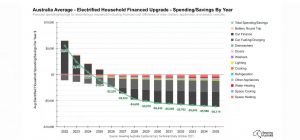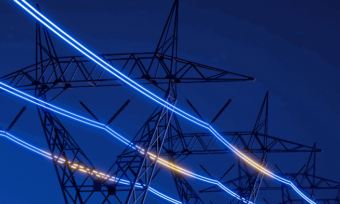ACT to ditch natural gas by 2045, bans new gas connections from 2023

Natural gas for cooking, heating and hot water will soon be a thing of the past for homes and businesses in the Australian Capital Territory after the territory government announced plans to ditch the fossil fuel.
The ACT Government has committed to phasing out natural gas use for residents and business owners over the next two decades, in an effort to reach its target of net zero emissions by 2045.
The transition will kick off with bans on new gas connections for certain property types from 2023, according to the Powering Canberra: Our Pathway to Electrification roadmap that was released on August 4.
Andrew Barr, the territory’s Minister for Climate Action, said swapping natural gas for electricity was the best way for the ACT to phase out fossil fuels.
“Gas prices have risen by around 25 per cent since 2016 and are expected to continue to rise,” he said. “In short, the days of cheap gas in Australia appear over and renewable electricity is now the cheapest and cleanest way to power our homes and businesses.”
At least 67 per cent of Canberrans use natural gas in their homes, according to a survey conducted by the ACT Government in February 2022. Residents predominately used natural gas for water heating, cooking and home heating, the same survey found.
With such a large portion of energy customers in the ACT relying on natural gas, however, the February survey revealed respondents’ concerns that transition to electricity may be costly for some residents and businesses.
In the survey, 60 per cent of respondents said that the biggest barrier preventing them from transitioning to electric appliances was the initial cost. Other hurdles included the level of effort required to switch (32%), a preference for gas (24%) and seeing a lack of value in swapping these appliances out (21%).
But Mr Barr assured bill-payers that it’s a slow-paced transition and natural gas supply wouldn’t be terminated immediately.
“We know there will be costs associated with the transition away from gas, which is why we are giving people certainty now so that the transition can happen gently over the next two decades,” he said. “This is a long-term and gentle transition and we’re not switching off the gas network overnight. Like the transition from analogue to digital TV, or the phase out of leaded petrol, this will be a staged and managed transition.”
ACT natural gas customers are not required to take immediate action to switch to electrical appliances. Instead, the territory government has asked that when the time came to replace an older gas appliance, that residents consider choosing an electric one instead.
The territory government has also suggested residents and business owners start planning what their own transition will look like from next year.
In the last two to three years, 16 per cent of Canberrans had replaced a gas-powered appliance with an electric equivalent, according to the February 2022 survey. Almost 60 per cent of residents in the nation’s capital also said they had already considered switching away from natural gas.
The surveyed Canberrans said incentives or rebates to help pay for new appliances would be their biggest motivator (54%) to switch from a gas to electric-powered appliance.
ACT residents currently have access to the government’s Sustainable Household Scheme that allows eligible homeowners to borrow up to $15,000 as an interest-free loan to make energy efficient upgrades to their home.
Natural gas is claimed to source 20 per cent of greenhouse gas emissions in the ACT.
Since 2020, 100 per cent of the ACT’s electricity supply has been sourced from renewable energy sources.
The announcement from the ACT Government follows concerns from the Australian Competition and Consumer Commission (ACCC) that Australia would have a 10 per cent shortfall in the amount of natural gas needed for home and business use next year if supply issues were not addressed.
Will switching to electric appliances make energy bills cheaper?
According to think tank, Rewiring Australia, switching to electric home appliances and vehicles could save the average Aussie household $5,000 per year on their power bill and vehicle costs.

Switching from natural gas to electricity isn’t accepted across the board as the best way to undertake a transition to renewable energy, with some commentators arguing that eliminating nature gas left little choice for energy consumers, while burdening them with the cost of replacing appliances.
Andrew Dillon, CEO of Energy Networks Australia, a national body that represents Australia’s electricity and gas distribution networks, said utilising existing infrastructure to decarbonise gas was a much more effective way to go, in response to the ACT Government’s announcement.
“Studies show the lowest-cost pathway to net-zero is to repurpose existing gas pipelines and networks and provide clean renewable hydrogen and biomethane,” he said. “Decarbonising gas networks will also ensure we continue to have diversity of energy supply to ride through droughts in renewable generation, so we can keep the lights on and heat our homes when the sun isn’t shining and the wind isn’t blowing.”
Decarbonising gas through the use of hydrogen would cost half as much as transitioning to an electricity-only energy environment, according to Energy Networks Australia’s Gas Vision 2050 report.
When announcing the electricity-led transition, the ACT Government said it had considered using hydrogen and biogas as a transition option but that its research found electrification was the most cost-effective option for energy consumers. The territory government did, however, point out that this pathway would include investigating the use of renewable gases in instances where electrification was unachievable.
The ACT Government is not the only territory or state to move towards electrification, with the Victorian Government recently announcing its removal of the gas connection mandate from new housing developments. This means that new homes would no longer need to be built with a connection to the natural gas mains included.
The Victorian Government is also encouraging residents and business owners to transition to electric and solar appliances through its Victorian Energy Upgrades scheme. This helps energy users to combat the higher cost of purchasing energy efficient appliances through the use of discounts and rebates.
According to the Victorian Energy Upgrades website, the average Victorian household can save $110 a year on energy bills by replacing inefficient appliances.

Image credit: Chepko Danil Vitalevich/Shutterstock.com, Rewiring Australia website
This article was reviewed by our Utilities Editor Tara Donnelly before it was updated, as part of our fact-checking process.







